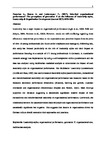Inherited organisational performance? The perceptions of generation Y on the influence of leadership styles
| dc.contributor.author | Nazarian, A | en |
| dc.contributor.author | Soares, A | en |
| dc.contributor.author | Lottermoser, T | en |
| dc.date.accessioned | 2018-02-06T18:23:02Z | |
| dc.date.available | 2018-02-06T18:23:02Z | |
| dc.date.issued | 2017-06-11 | en |
| dc.identifier.issn | 0143-7739 | en |
| dc.identifier.uri | http://hdl.handle.net/10026.1/10739 | |
| dc.description.abstract |
Purpose Leadership has a major impact on organizational performance (Agle et al., 2006; Felfe and Schyns, 2004; Peterson et al., 2003). However, results are still conflicting regarding these effects and research has yet to focus on the expectations and perceived impact from the point of view of young professionals (the future senior employees and managers). Therefore, the purpose of this paper is to investigate how leadership is perceived and how leadership styles influence performance from the perspective of young professionals. Design/methodology/approach A quantitative research strategy was implemented by using a self-completion online questionnaire and the data were analyzed using multivariate statistical analysis to demonstrate the impact of each leadership style on organizational performance. The Multifactor Leadership Questionnaire (Bass and Avolio, 1995) was used to measure leadership styles (passive/avoidant, transactional and transformational leadership) and organizational performance was measured based on the balanced scorecard performance dimensions (financial, learning and growth, customer orientation and organizational effectiveness) (Kaplan and Norton, 2005). Findings The main findings supported the literature suggesting a statistically significant positive impact of both transactional and transformational leadership on organizational performance. Conversely, the relationship between the passive/avoidant leadership style and organizational performance was statistically significant but negative. This suggests that leaders in organizations driven by German culture should reconsider their approaches and practices. Originality/value The present study has focused on the responses from young German professionals who represent future organizational success. Consequently, it is of major importance to know how these groups assess the leadership style of their leaders and how this has an influence on organizational performance. | en |
| dc.format.extent | 1078 - 1094 | en |
| dc.language.iso | en | en |
| dc.publisher | Emerald | en |
| dc.subject | Organizational performance, Generation Y, Leadership styles, Organizational size | en |
| dc.title | Inherited organisational performance? The perceptions of generation Y on the influence of leadership styles | en |
| dc.type | Journal Article | |
| plymouth.issue | 7 | en |
| plymouth.volume | 38 | en |
| plymouth.publication-status | Published | en |
| plymouth.journal | Leadership and Organization Development Journal | en |
| dc.identifier.doi | 10.1108/LODJ-05-2016-0119 | en |
| plymouth.organisational-group | /Plymouth | |
| plymouth.organisational-group | /Plymouth/REF 2021 Researchers by UoA | |
| plymouth.organisational-group | /Plymouth/REF 2021 Researchers by UoA/UoA17 Business and Management Studies | |
| dcterms.dateAccepted | 2017-03-31 | en |
| dc.rights.embargoperiod | Not known | en |
| rioxxterms.versionofrecord | 10.1108/LODJ-05-2016-0119 | en |
| rioxxterms.licenseref.uri | http://www.rioxx.net/licenses/all-rights-reserved | en |
| rioxxterms.licenseref.startdate | 2017-06-11 | en |
| rioxxterms.type | Journal Article/Review | en |


